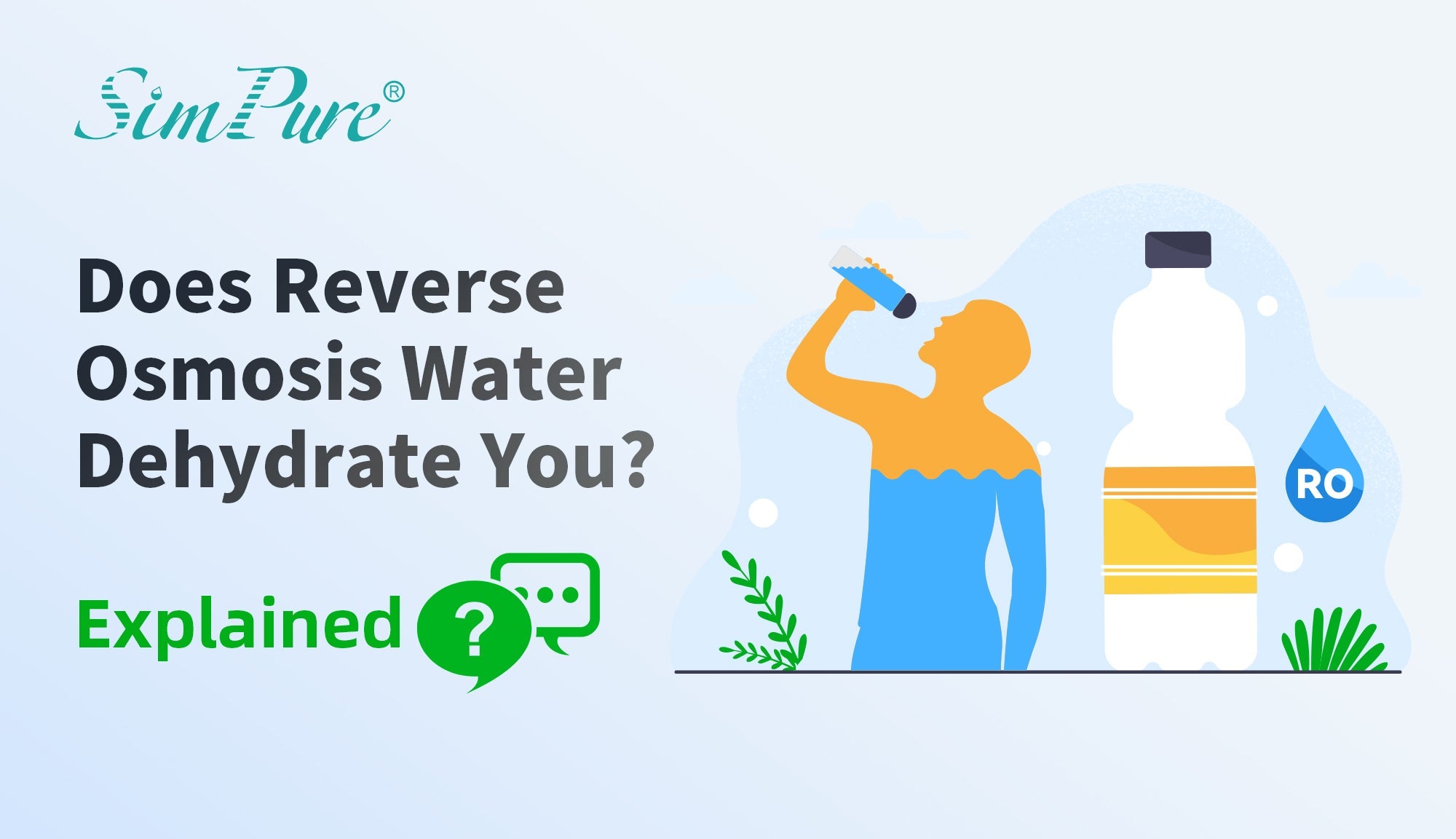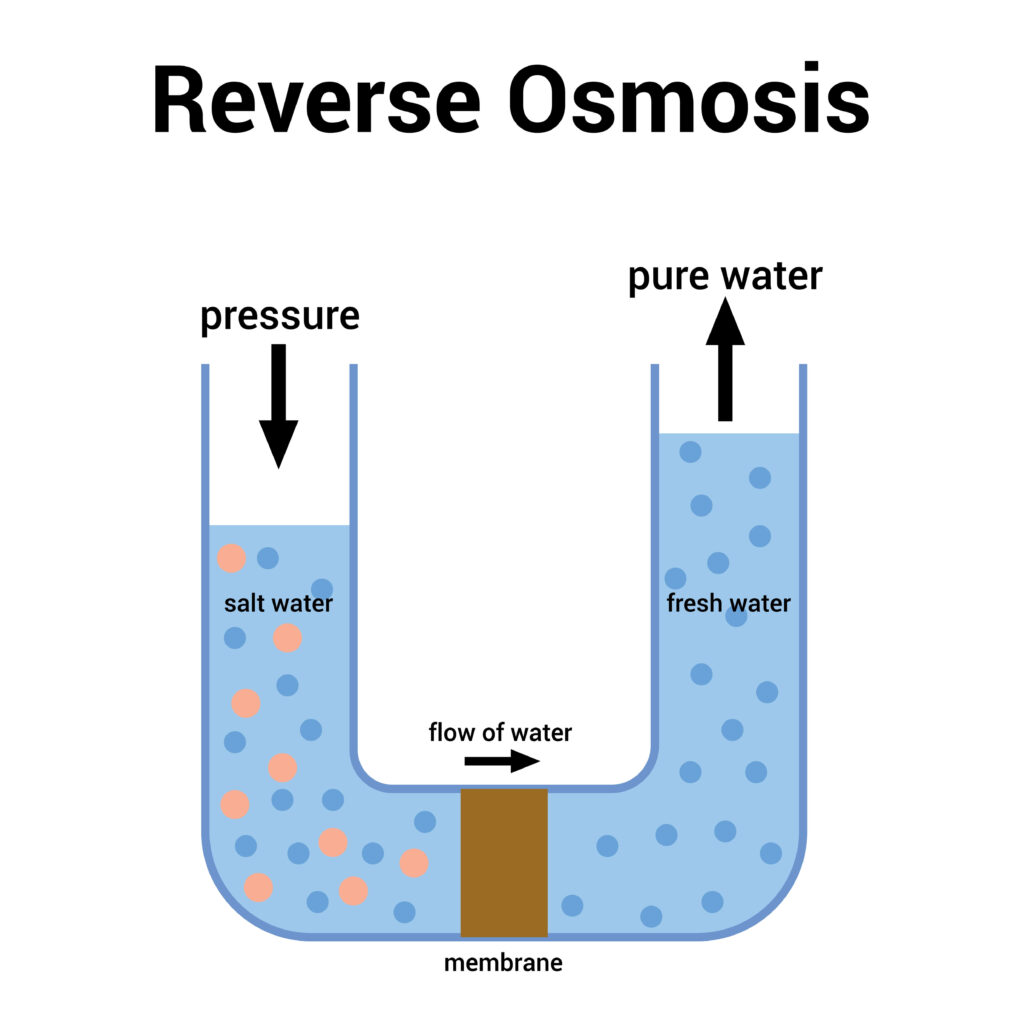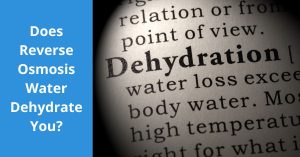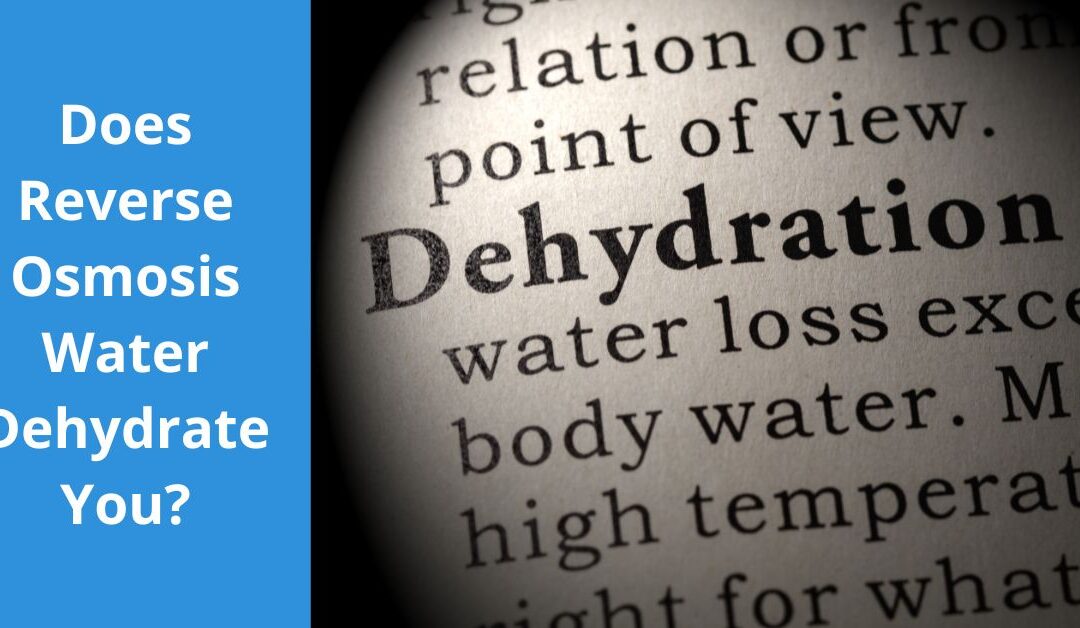Are you concerned about whether the water you drink is actually keeping you hydrated? You’re not alone.
Many people wonder if reverse osmosis (RO) water could be doing more harm than good. You’ve invested in a high-tech filtration system to ensure the purity of your drinking water, but there’s a nagging question: Can RO water cause dehydration?
This article will explore the science behind RO water and its effects on your body. We’ll also uncover some surprising truths that could change the way you think about hydration. By the end, you’ll have a clear understanding of whether your RO system is a hydration hero or a potential pitfall. So, let’s dive in and quench your thirst for knowledge!

Credit: www.simpurelife.com
Ro Water Basics
RO water, or reverse osmosis water, is a popular choice for drinking. Many people believe it offers cleaner, safer water. But some worry it might cause dehydration. Understanding RO water is essential to know its effects.
What Is Ro Water?
RO water is water filtered using reverse osmosis. This process removes impurities and contaminants. It leaves behind purified water. Often, people use it for drinking and cooking. Some believe it tastes better than tap water. It is usually free of harmful substances.
How Reverse Osmosis Works
Reverse osmosis uses a special membrane. Water passes through this membrane under pressure. The membrane blocks impurities and contaminants. Only pure water molecules get through. This process removes minerals, salts, and chemicals. It leaves water cleaner and safer.
RO systems often have multiple filtration stages. Each stage targets different impurities. This ensures maximum purity. The result is water that’s clear and safe for drinking. Understanding this process helps in assessing its effects on health.
Nutrient Content In Ro Water
Have you ever wondered about the nutrient content in the water you drink every day? Reverse Osmosis (RO) water is often hailed for its purity, but what about its nutrient profile? While it’s true that RO systems effectively remove contaminants, they also strip away some essential minerals. This can raise questions about whether drinking RO water might impact your nutrient intake.
Mineral Removal In Ro Process
RO systems are designed to purify water by forcing it through a semipermeable membrane. This process removes impurities, but it also removes minerals like calcium, magnesium, and potassium. These minerals are vital for your body’s functions, from bone health to muscle function. When these are removed, RO water becomes “demineralized,” potentially lacking in these important nutrients.
Imagine drinking water that’s pure but missing those essential nutrients. It’s a bit like eating bread without the butter. You get the bulk, but something vital is missing. This lack of minerals can make some people wonder if RO water is sufficient for their daily needs.
Impact On Essential Nutrients
What happens to your body when you miss out on these minerals? The absence of calcium and magnesium, for example, can affect bone density and cardiovascular health. Potassium is crucial for nerve function and muscle contractions. Without these nutrients, your body might not function at its best.
Consider how you balance your diet to ensure you get enough nutrients. Your water choice should also be part of this balance. Some people add mineral drops to their RO water or consume foods rich in these nutrients to compensate. Are you doing enough to ensure your water is not just pure but also nourishing?
Have you ever felt unusually tired or cramped after switching to RO water? It might be worth looking at your overall nutrient intake. Ensuring your diet is rich in necessary minerals can help counteract any potential deficiencies from drinking RO water.
Thinking about these factors can help you make informed choices about your water and overall health. When you pay attention to both purity and nutrient content, you can enjoy the best of both worlds. How will you ensure your hydration supports your well-being? Your choices today can shape your health tomorrow.
Hydration And Electrolytes
Water is essential for maintaining hydration, but not all water types are created equal. While reverse osmosis (RO) water is popular for its purity, there’s ongoing debate about its impact on hydration. The key lies in understanding the balance between water and electrolytes. Electrolytes are crucial for your body’s hydration levels, as they help regulate fluid balance. Could RO water, stripped of minerals, affect this balance?
Role Of Electrolytes In Hydration
Electrolytes such as sodium, potassium, and magnesium play a vital role in hydration. They help your body absorb water efficiently and maintain fluid balance. Imagine electrolytes as the traffic controllers for water in your body, ensuring it flows where needed. Without them, water might not be as effective in hydrating your cells.
Ever noticed how sports drinks are packed with electrolytes? That’s because after intense exercise, your body loses these vital minerals through sweat. Replenishing them helps you stay hydrated and recover faster. RO water lacks these minerals, potentially making it less effective in maintaining optimal hydration.
Comparison With Other Water Types
How does RO water stack up against other types of water? Consider mineral water, which contains naturally occurring electrolytes. This type of water offers a balance between purity and mineral content, supporting hydration more effectively than RO water.
Spring water is another option. It retains some essential minerals while being naturally filtered. If you’re looking for a hydrating water option, mineral and spring water might be better choices than RO water. They provide the essential electrolytes your body needs.
Have you ever felt thirsty even after drinking plenty of water? It might be due to a lack of electrolytes. Next time you’re choosing your water, think about how it might impact your hydration levels. Could adding a pinch of sea salt to RO water be a simple solution to boost its hydration potential?

Credit: www.cruiserowaterandpower.com
Potential Health Impacts
You’ve probably heard the buzz around Reverse Osmosis (RO) water and its supposed health effects. Some people worry that RO water might cause dehydration. Understanding the potential health impacts is crucial. Let’s dive into the myths and scientific evidence surrounding this topic.
Myths Around Dehydration
Many people believe RO water is “too pure” and lacks essential minerals, potentially leading to dehydration. Have you ever wondered if that’s just a myth? The idea stems from the fact that RO water removes contaminants and minerals. Some folks claim this leads to an imbalance, causing dehydration.
Imagine drinking water that’s stripped of everything. It sounds concerning, right? However, the reality is more nuanced. While RO water is low in minerals, it doesn’t directly cause dehydration. Your body’s hydration needs depend more on the quantity of water you drink, not just the mineral content.
Scientific Evidence
Science offers a clearer picture. Studies show RO water is safe for hydration. It efficiently quenches thirst, just like any other water. But what about those missing minerals? You actually get minerals from various food sources. Your diet plays a more significant role than water alone.
Consider this: if RO water caused dehydration, many people worldwide would experience it. Yet, millions drink RO water daily without issues. Scientific evidence supports its safety for consumption. Experts emphasize drinking adequate amounts of water to stay hydrated, regardless of its mineral content.
Are you concerned about the minerals in your water? You can easily add them back with supplements if needed. But remember, hydration isn’t solely about minerals; it’s about drinking enough water each day.
So, what’s your take on RO water now? Does the evidence change your perspective? Drinking RO water won’t dehydrate you, as long as you drink enough. Your hydration depends on your habits, not the type of water.
Ro Water And Daily Hydration
Reverse osmosis (RO) water is popular for its purity. Many households use it for drinking and cooking. But does RO water affect daily hydration levels? Understanding how RO water interacts with your body’s hydration needs is vital.
Water is essential for health. It helps with digestion, regulates temperature, and keeps skin healthy. RO water is free from impurities, making it ideal for consumption. Yet, some worry about its impact on hydration. Let’s explore how RO water fits into your daily hydration routine.
Recommended Water Intake
Adults need about 2 to 3 liters of water daily. This includes water from food and beverages. Drinking enough water is crucial for maintaining health. RO water provides clean hydration without contaminants. Use RO water to meet your daily intake needs.
Ensuring Balanced Nutrition
RO water lacks minerals found in regular tap water. While it’s clean, it may not provide essential nutrients. Ensure you get minerals from food sources like fruits and vegetables. A balanced diet complements RO water, keeping your body hydrated and nourished. Prioritize foods rich in minerals.
Alternatives And Solutions
Have you ever found yourself wondering if your choice of drinking water might be doing more harm than good? If you’re concerned about the effects of reverse osmosis (RO) water and dehydration, fear not. There are alternatives and solutions to ensure you stay hydrated without compromising essential nutrients.
Re-mineralization Options
Reverse osmosis water is pure, but it can lack essential minerals. Adding minerals back is a smart move to enhance hydration. Simple options include mineral drops or tablets that are easy to use. You can also opt for a water filter pitcher designed to re-mineralize. These devices add calcium and magnesium, which are vital for your body’s health.
Using a pinch of natural sea salt in your water is another quick fix. It’s a trick many people swear by for a refreshing taste and mineral boost. Have you ever tried it? You might be surprised by the difference in taste and how it makes you feel.
Choosing The Right Water Source
It’s crucial to pick water that meets your hydration needs. Consider spring water or mineral water, which naturally contain minerals. These water sources support your body’s mineral balance while keeping you hydrated.
If bottled water isn’t your go-to, look into local water delivery services. Many offer mineral-rich options right to your door. Have you thought about exploring what’s available in your area?
Tap water, often overlooked, can be a viable choice. With the right filtration, it retains essential minerals. Investing in a quality water filter is a cost-effective way to ensure your tap water supports your health.
Your choice of water impacts your hydration and well-being. Have you found the right balance yet? It’s worth experimenting to discover what works best for you.
Expert Opinions
Many people wonder about the effects of RO water on hydration. Experts have weighed in on the debate. Their insights help clarify whether RO water can lead to dehydration. Let’s explore what health professionals and environmental experts say.
Health Professionals’ Views
Health professionals have diverse opinions on RO water’s impact. Some believe it lacks essential minerals. These minerals support hydration and overall health. Without them, the body might not absorb water efficiently. But others argue that a balanced diet compensates for this. They suggest drinking RO water does not necessarily cause dehydration.
Environmental Considerations
Environmental experts focus on RO water’s production process. The process removes impurities. But it also discards a significant amount of water. This waste raises concerns about resource conservation. While the water is pure, its production can impact the environment. The debate continues on balancing purity and sustainability.

Credit: www.livingwhole.com.au
Frequently Asked Questions
Can Ro Water Lead To Dehydration?
RO water does not cause dehydration. It removes impurities, making it clean and safe. While it lacks minerals, it hydrates like regular water. To avoid mineral deficiency, maintain a balanced diet or consider supplements. RO water is safe for daily consumption and doesn’t lead to dehydration.
Is Ro Water Lacking Essential Minerals?
RO water filters out impurities, including minerals. While it’s safe to drink, it lacks essential minerals like calcium and magnesium. These minerals are vital for health. To compensate, include mineral-rich foods in your diet. Alternatively, consider mineral supplements. RO water is clean but not mineral-rich.
Does Ro Water Affect Hydration Levels?
RO water doesn’t affect hydration negatively. It hydrates as effectively as tap water. The filtration process removes impurities, not hydration properties. Drinking RO water regularly ensures proper hydration. For balanced mineral intake, complement RO water with nutritious foods. It’s safe and efficient for maintaining hydration levels.
Is Ro Water Safe For Daily Consumption?
RO water is safe for everyday use. It effectively removes contaminants, making it pure and clean. While it lacks minerals, it’s safe to drink. Ensure balanced nutrition to compensate for mineral loss. RO water is a reliable choice for hydration, ensuring safety and cleanliness in daily consumption.
Conclusion
RO water doesn’t directly cause dehydration. It lacks minerals found in tap water. These minerals help maintain the body’s balance. Consuming only RO water may result in mineral deficiency over time. Drinking a balanced diet and staying hydrated are essential.
RO water is safe for regular consumption. Always ensure a balanced intake of nutrients. It’s good to drink various types of water. Diversity in drinking water sources can prevent any health concerns. Stay informed about your drinking water choices. Choose what’s best for your health and lifestyle.

Hasan Al Sarker is a Reverse Osmosis Specialist. He has worked for many years to ensure safe drinking water for all. His research paper has been published in several journals, including Issue, Medium, and Slideshare. He is recognized as a water doctor among specialists though he did not attend medical college.
Besides working as a researcher of reverse osmosis technology, he is also very fancy with the kitchen and cooking. His guides are reading thousands of people every day. As a head of content, he is responsible for all the published articles at RO System Reviews.

